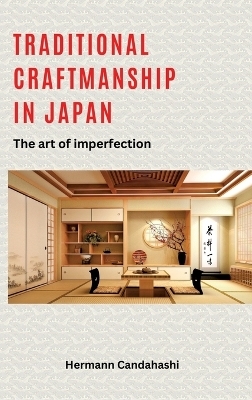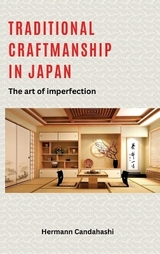Dear readers, I am pleased to present to you, after a longer time of research and preparation, my new book on Japanese craftsmanship. Like the creations within it, this book adheres to the principle of Wabi-Sabi and cannot illuminate all facets and characteristics of this vast realm of Japanese traditions. Nevertheless, it may be suitable to inspire you to further explore aspects of these fascinating art forms. If I succeed in this with you, I would have achieved my goal.An excerpt:"Japanese craftsmanship possesses the unique ability to blend artistry and functionality. It spans from the traditional tea ceremony to intricately crafted ceramics, from finely carved woodwork to breathtaking textiles. These traditions are passed down from generation to generation, serving as expressions not only of skill but also of deep cultural and religious significance. Imperfection in them is not seen as failure, as it might be in Western countries, but rather as a path to a rarely attained perfection.A key aspect of Japanese craftsmanship is the reverence for nature and simplicity. Many artisans draw inspiration from nature, whether it be the elegant line of a bonsai tree or the flowing movement of a koi fish. This connection to nature is reflected not only in the motifs but also in the materials used. Wood, bamboo, paper, and silk often form the foundation for these artistic creations.The transmission of craftsmanship occurs in specialized workshops, where masters of their craft pass on their skills to apprentices. These apprenticeships are characterized by dedication, discipline, and a profound respect for the craft. Apprentices not only learn the technical skills but also the philosophy behind each technique. It is this fusion of technique and spirituality that makes Japanese craftsmanship truly unique.One of the most fascinating examples of traditional craftsmanship in Japan is the art of Kintsugi, the repair of ceramics with a mixture of gold or silver lacquer. Instead of hiding the breakages, they are accentuated with precious metals, adding not only an aesthetic element but also conveying a philosophical message - the beauty of repair and the appreciation for the impermanent.In the upcoming chapters, we will delve into the various facets of Japanese craftsmanship, from the intricate Noh masks to the precise artistry of Samurai swords. Join us on a journey through centuries of tradition and innovation as we explore the legacy of Japanese craftsmanship..."
I was born and raised in Germany, but I discovered my interest and passion for Japan at a young age, initially through movies and literature. After completing my education, I went on my first trips. I was increasingly impressed by the beauty of Japanese nature and the hospitality of the people. My enthusiasm and love for the country with its long cultural tradition, its contradictions and rituals, which still influence life in many areas, continues to this day.
In my books, I would like to share my admiration and love for Japan with you. At the same time, I try to build a bridge between our two cultures. My aim is to promote understanding and appreciation of Japanese culture. If I have succeeded in doing this with you, dear reader, I will have fulfilled a wish and possibly aroused your interest in other topics relating to this country through my books.
Hermann Candahashi
| Erscheinungsdatum |
25.01.2024
|
| Verlagsort |
Elmshorn |
| Sprache |
englisch |
| Maße |
148 x 210 mm |
| Gewicht |
495 g |
| Themenwelt
|
Kunst / Musik / Theater ► Kunstgeschichte / Kunststile |
| Schlagworte |
Japan • Japanese Design • japanese design traditions • Japanese Food • japanese food art • Japanese Gardens • japanese kimono • japanese laquers • japanese pottery • japaneses craftmanship • japanese swordsmiths • japanese tayloring • Japanese Tea Ceremony • japanese traditions • japanese washi • Japanese Zen • Katana • moos gardens • Tatami • Wabi-Sabi • washi paper • zen gardens |
| ISBN-10 |
3-384-11941-X / 338411941X |
| ISBN-13 |
978-3-384-11941-4 / 9783384119414 |
| Zustand |
Neuware |




